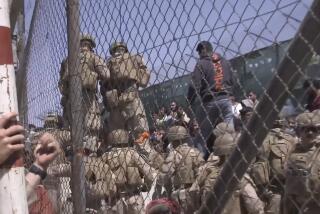Gen. John Allen takes command of Afghan war
A new U.S. commander, Gen. John Allen, formally took control of the war in Afghanistan on Monday, inheriting a nearly decade-long conflict that has cost the lives of at least 1,667 American troops.
Allen succeeds Gen. David H. Petraeus, who is leaving to head the CIA. Petraeus had been in command for only a year, hastily taking the helm after President Obama fired Gen. Stanley McChrystal after Rolling Stone magazine reported intemperate comments by his staff about the administration’s civilian leadership.
Petraeus’ tenure coincided with the arrival of a “surge” of U.S. troops, and the military said the extra manpower yielded battlefield dividends, particularly in Afghanistan’s restive south. But senior commanders have described these gains as fragile and reversible, and some military officials have voiced fears that the American drawdown that began earlier this month will leave remaining troops particularly vulnerable.
Moreover, the danger level has steadily increased for Afghan civilians. The United Nations reported last week that noncombatant deaths jumped by 15% in the first half of the year. Insurgents were blamed for four-fifths of those fatalities, but many Afghans lay the responsibility for the growing danger of daily life at the doorstep of foreign troops.
Allen also takes command at a time when NATO allies are seeking to scale back their presence. Afghan troops are taking security control this month of seven cities or areas, a process that began this week with the formal transfer of responsibility in Bamiyan, one of Afghanistan’s safest provinces.
Many Afghans, though, are increasingly nervous about their safety, particularly after a brazen attack in the Afghan capital on Sunday night killed a senior aide to President Hamid Karzai. In the past week, the Afghan leader had sustained another blow -- the assassination of his half-brother, Ahmed Wali Karzai, the main power broker in Afghanistan’s south.
At a handover ceremony at the heavily fortified headquarters of the NATO force, Allen vowed to “maintain the momentum” of the Afghan battle. However, he takes control at a time when many lawmakers are looking for ways to curtail the U.S. presence in Afghanistan.
This year, the Taliban movement’s traditional spring offensive has resulted in almost no head-to-head battles between U.S. troops and the insurgents. However, levels of troop deaths remain high, mainly due to increasingly powerful and sophisticated improvised explosive devices, or IEDs, employed by the Taliban and other groups. These weapons take a heavy civilian toll as well.
An IED blast in the east killed three members of the NATO force on Monday, Western military officials said, without disclosing the nationalities of those slain. The bulk of the troops serving in the east are Americans.
laura.king@latimes.com
More to Read
Start your day right
Sign up for Essential California for news, features and recommendations from the L.A. Times and beyond in your inbox six days a week.
You may occasionally receive promotional content from the Los Angeles Times.






